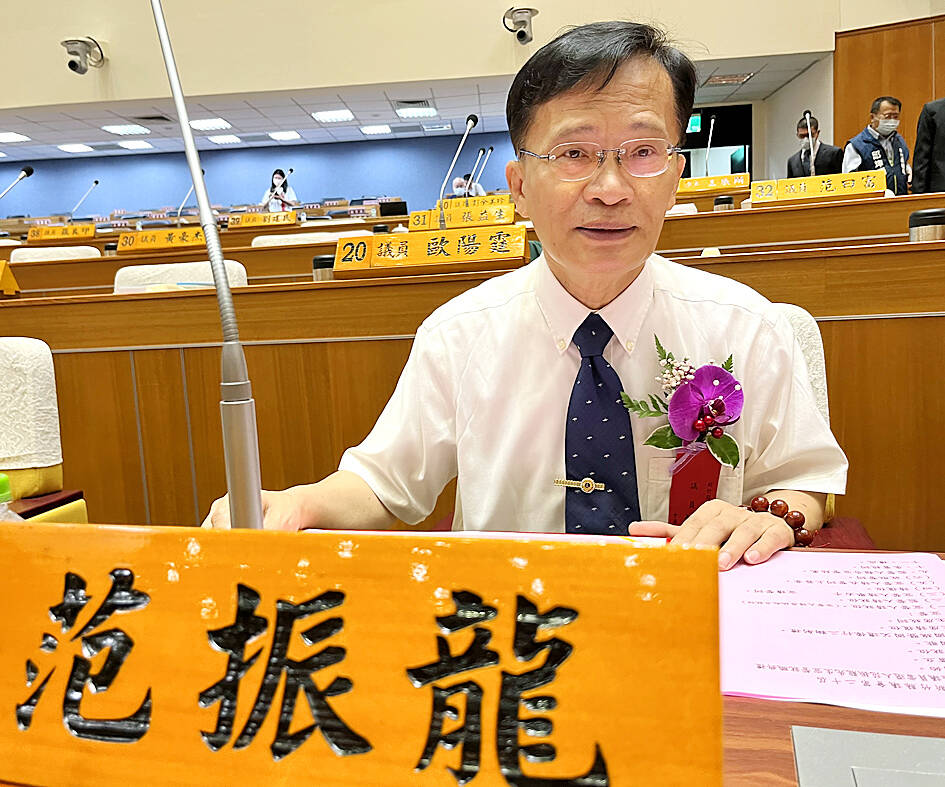Hsinchu City Councilor Fan Cheng-lung (范振龍) of the Chinese Nationalist Party (KMT) was stripped of his office yesterday after being convicted of vote-buying, while in New Taipei City, residents accused KMT candidate Chang Chih-lun (張智倫) of attempted vote-buying by distributing liquor and red envelopes.
Fan in a second trial was handed a three-year, two-month prison term and deprived of his civil rights for four years, and the Supreme Court yesterday in the final decision rejected his appeal of the sentence.
Fan was not among the five candidates to win seats in Hsinchu County’s second electoral district in 2022, but when Chen Te-mu (陳德木) was convicted of vote-buying last year, Fan — who was next in line due to his vote count — replaced him.

Photo: Liao Hsueh-ju, Taipei Times
It is the first time in the history of local elections in Taiwan that members of the same party are ousted from the same public office back-to-back.
During campaigning in 2022, Fan disbursed money to local vote brokers and executives of the Fan family association, instructing them to give it to residents to secure their votes, investigators said.
Fan provided lists of eligible voters, who were to be given NT$1,000 if they were a Fan association member and NT$500 if not, people involved in the scheme told investigators.
Fan and several others admitted to vote-buying activities and were found guilty in February last year of contravening the Public Officials Election and Recall Act (公職人員選舉罷免法).
They were initially handed suspended sentences because they plead guilty.
However, prosecutors appealed, leading to the second ruling, in which Supreme Court judges agreed they had committed a serious offense that undermined the electoral process.
Meanwhile, Democratic Progressive Party legislative candidate Justin Wu (吳崢) said in a briefing that his opponent in New Taipei City’s Jhonghe District (中和), Chang Chih-lun (張智倫), had handed out money and gifts to buy votes.
Wu demanded an investigation.
Videos and items provided by residents prove that Chang attempted to buy votes in activities that have been going on for weeks at neighborhood banquets and campaign events, Wu said.
“We demand that the authorities take action and rule Chang ineligible to run for legislative office due to clear evidence from members of the public showing Chang and his aides presenting bottles of liquor and red envelopes containing NT$3,000 to attendees,” Wu said, adding that Chang also gave checks of tens of thousands of New Taiwan dollars to communty associations.
Chang Chih-lun is the son of Chang Ching-chung (張慶忠), a former KMT legislator who owns several franchise motels nationwide and has been accused of illegal deals to take over public land.
Chang Ching-chung has also drawn criticism for his role in the 2014 attempt to pass the cross-strait service trade agreement with China by conducting a rapid roll call during a legislative session, actions that were part of the buildup to the Sunflower movement.

Chinese Nationalist Party (KMT) Chairman Eric Chu (朱立倫), spokeswoman Yang Chih-yu (楊智伃) and Legislator Hsieh Lung-chieh (謝龍介) would be summoned by police for questioning for leading an illegal assembly on Thursday evening last week, Minister of the Interior Liu Shyh-fang (劉世芳) said today. The three KMT officials led an assembly outside the Taipei City Prosecutors’ Office, a restricted area where public assembly is not allowed, protesting the questioning of several KMT staff and searches of KMT headquarters and offices in a recall petition forgery case. Chu, Yang and Hsieh are all suspected of contravening the Assembly and Parade Act (集會遊行法) by holding

PRAISE: Japanese visitor Takashi Kubota said the Taiwanese temple architecture images showcased in the AI Art Gallery were the most impressive displays he saw Taiwan does not have an official pavilion at the World Expo in Osaka, Japan, because of its diplomatic predicament, but the government-backed Tech World pavilion is drawing interest with its unique recreations of works by Taiwanese artists. The pavilion features an artificial intelligence (AI)-based art gallery showcasing works of famous Taiwanese artists from the Japanese colonial period using innovative technologies. Among its main simulated displays are Eastern gouache paintings by Chen Chin (陳進), Lin Yu-shan (林玉山) and Kuo Hsueh-hu (郭雪湖), who were the three young Taiwanese painters selected for the East Asian Painting exhibition in 1927. Gouache is a water-based

Taiwan would welcome the return of Honduras as a diplomatic ally if its next president decides to make such a move, Minister of Foreign Affairs Lin Chia-lung (林佳龍) said yesterday. “Of course, we would welcome Honduras if they want to restore diplomatic ties with Taiwan after their elections,” Lin said at a meeting of the legislature’s Foreign Affairs and National Defense Committee, when asked to comment on statements made by two of the three Honduran presidential candidates during the presidential campaign in the Central American country. Taiwan is paying close attention to the region as a whole in the wake of a

OFF-TARGET: More than 30,000 participants were expected to take part in the Games next month, but only 6,550 foreign and 19,400 Taiwanese athletes have registered Taipei city councilors yesterday blasted the organizers of next month’s World Masters Games over sudden timetable and venue changes, which they said have caused thousands of participants to back out of the international sporting event, among other organizational issues. They also cited visa delays and political interference by China as reasons many foreign athletes are requesting refunds for the event, to be held from May 17 to 30. Jointly organized by the Taipei and New Taipei City governments, the games have been rocked by numerous controversies since preparations began in 2020. Taipei City Councilor Lin Yen-feng (林延鳳) said yesterday that new measures by